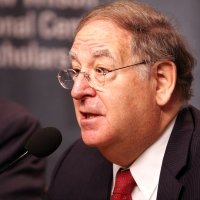The Role of Plea Bargains in the Fight Against Corruption: A Presentation by Brazil’s Attorney General, Rodrigo Janot
A summary in English of Dr. Janot's remarks is available for download below.
Plea bargain agreements, signed into law in 2013 in the wake of massive street protests, are a key instrument of Brazilian prosecutors in the fight against corruption in the country. More than one hundred and sixty such agreements have been signed since 2014 by political operatives and business executives accused of laundering state funds, bribery of public and private sector officials, and obstruction of justice. Most of these cases stem from investigations involving contracts between state energy giant Petrobras and a dozen construction companies, known as the “Operação Lava Jato.”
Always a source of controversy among legal experts, the debate over plea bargains is very important in the context of the Lava Jato investigations, which have exposed the systemic nature of the corruption confronting Brazilian society.
On July 17, Attorney General Rodrigo Janot addressed the use of plea bargains in the promotion of justice and the rule of law in Brazil. The lecture is part of the Brazil Institute’s Rule of Law Series, co-sponsored by the Washington College of Law at American University.
Key Quotes:
Attorney General Rodrigo Janot (original Portuguese):
“No direito brasileiro, a colaboração premiada é meio de obtenção de prova, e não meio de prova.”
“In Brazilian law, plea bargains are a means of obtaining proof, not proof in themselves.”
“A colaboração, ela deve ser voluntária, ela deve ser espontânea. A oposação não pode oferecer colaboração à defesa. A decisão de colaborar com a justiça, se tornar réu ou investigado colaborando com a justiça, deve partir espontâneamente e voluntáriamente do próprio colaborador.”
“Plea bargaining should be voluntary and it should be spontaneous. The prosecution cannot offer a plea bargain to the defense. The decision to collaborate with the judiciary, to become a defendant under investigation collaborating with the judiciary, should come spontaneously and voluntarily from the collaborators themselves.”
“Uma das críticas... é que a oposição, e de certa forma a defesa também, prende as possas para que através da restrição ao direto de liberade, ao direito de ir e vir, se force indireitamente o réu a colaborar com a justiça brasileira. Isso não é fato, isso não é verdade... 85% desses acordos foram feitos com réus ou investigados livres que não sufriam qualquer restrição a sua liberdade de locomação.”
“One of the critiques… is that the prosecution, and to a degree, the defense as well, arrests people so that – through the restriction of their right to liberty, of their right to come and go – they can force the defendant indirectly to collaborate with the Brazilian judiciary. This is not a fact, this is not the truth… 85 percent of the agreements were made with free defendants that did not suffer any restriction to their freedom of movement.”
On learning of the recordings of President Michel Temer’s conversation with Joesley Batista: "A primeira reação nossa foi dizer que era mentira, que não podia acontecer aquilo. Depois de três anos e meio de Lava-Jato, com todos os números alcançados, era inacreditável que a prática de crime continuasse de maneira aberta.”
“Our first reaction was to say that this was a lie, that this could not have happened. After three and a half years of Lava Jato, with all that we have achieved, it was unbelievable that the practice of crime continued in such an open manner.”
“Tive que sopesar o interesse público de conceder a imunidade a criminosos – e são criminosos mesmo... Ninguém se sente feliz concedendo imunidade a criminoso. Mas foi o que foi possível."
“I had to weight public interest in granting immunity to criminals – and they are indeed criminals… No one feels happy granting immunity to criminals. But that was what was possible.”
“Se houve ou não obstrução de justiça [no caso do Presidente Temer], eu não posso dizer agora. É prematuro eu dizer.”
“I cannot say if there was or was not obstruction of justice [in President Temer’s case]. It’s premature for me to say.”
“A pessoa que entrega no curso do cometimento do crime um presidente da República... Eu duvido que para o padrão norte-americano isso não seria suficiente para entender pela imunidade.” “[If] a person delivers evidence of a crime by the president of the Republic… I doubt that under the North American standard this would not be sufficient to grant immunity [in a plea bargain].”
Speakers


Keynote Speaker

Moderator

Hosted By

Brazil Institute
The Brazil Institute—the only country-specific policy institution focused on Brazil in Washington—aims to deepen understanding of Brazil’s complex landscape and strengthen relations between Brazilian and US institutions across all sectors. Read more
